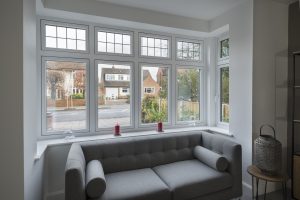When upgrading your windows, one of the most important decisions is the thickness of your double glazing. This comprehensive guide will help you understand the various thickness options available in the UK market, how they impact your home’s comfort, and what to consider when making your choice.
Whether you’re looking for improved thermal insulation, soundproofing, or energy efficiency, choosing the right double glazing thickness is key. Let’s explore which option is best suited for your home.
What Is Double Glazing?
Double glazing refers to a window or door made up of two panes of glass with a gap (typically filled with air or gas like argon or krypton) between them. This gap, known as a spacer bar, plays a critical role in reducing heat loss and improving energy efficiency. The thickness of the glass panes, the spacer, and the overall depth of the unit all contribute to the performance of the double glazing.
When considering double glazing thicknesses, you’re looking at two key elements: the thickness of each pane of glass and the width of the gap between them. These factors work together to create an insulated, energy-efficient barrier that reduces heat transfer and boosts acoustic insulation.
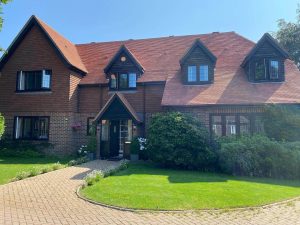
What Are the Different Options for Double Glazing?
In the UK, the most common double glazing units have a thickness between 24mm and 28mm. These units typically consist of two panes of 4mm glass separated by a 16mm spacer, but other configurations are available, including thicker glass options. Here’s a breakdown of the most common glass thicknesses and their impact on performance:
- 4mm Glass: The standard thickness for most double glazing units. It offers decent thermal insulation and is suitable for most uPVC windows and casement windows in standard homes.
- 6mm Glass: Thicker than the standard, offering better acoustic insulation and improved durability. Ideal for homes in high-traffic areas or near airports.
- 8mm Glass: Even thicker, providing superior sound reduction and strength. It’s a great option for homes in noisy environments or for large windows, like bay windows or timber windows in older properties.
Additionally, the spacer bar between the glass panes can vary in width, impacting the overall insulation and energy efficiency of the unit. Wider spacer bars create more space for insulating gas, which can reduce heat loss even further

What Are the Benefits of Double Glazing?
Double glazing provides several benefits that make it a popular choice for homeowners:
1. Improved Energy Efficiency
By reducing heat transfer, double glazing helps to maintain a consistent indoor temperature, reducing the need for heating in winter and cooling in summer. This leads to lower energy bills. Choosing the right glass thickness and spacer bar can boost this effect, especially when combined with argon gas in the cavity.
2. Better Soundproofing
Thicker double glazing, such as 6mm or 8mm glass, offers superior acoustic insulation, which is ideal for homes in urban areas or near busy roads. By minimising noise intrusion, thicker glass panes create a more serene indoor environment.
3. Increased Security
A thicker pane of glass is more difficult to break, making it a safer option for your home. Thick double glazing, especially with laminated or toughened glass, adds an extra layer of protection against forced entry.
4. Reduced Condensation
Double glazing reduces the likelihood of condensation forming on your windows, as the spacer bar and insulating gases minimise heat transfer. This helps maintain a clearer view and prevents moisture build-up that can damage your window frames.
5. Aesthetic Appeal
BSF Windows offers a range of styles and materials, from timber windows to sleek aluminium windows, that can be fitted with your choice of double glazing. Whether you’re after a contemporary design or a more traditional look, double glazing adds to both the comfort and appearance of your home.
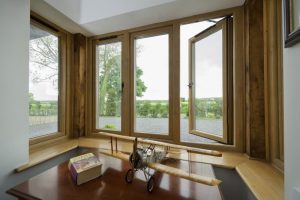
Can Double Glazing Save Me Money?
Absolutely! The main financial benefit of installing double glazing is the potential savings on your energy bills. With energy-efficient glass and low thermal conductivity spacers, you can significantly reduce the amount of heat lost through your windows.
For homeowners in areas with colder climates, thicker double glazing with a wider gap can offer even more savings. A properly insulated home not only reduces heating and cooling costs but can also increase the overall value of your property. If you’re looking to upgrade, opting for triple glazing or thicker double glazing might initially cost more but will provide greater long-term energy savings.
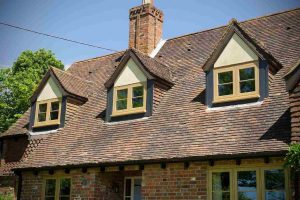
What Double Glazing Units Are Available?
At BSF Windows, we offer a wide range of double glazing options designed to meet the needs of homeowners across Surrey, Sussex, and beyond. Our product range includes:
- uPVC Windows: Known for their durability and energy efficiency, uPVC windows are the go-to choice for many modern homes.
- Aluminium Windows: Sleek and stylish, aluminium windows offer a contemporary aesthetic while delivering excellent performance and security.
- Timber Windows: For those seeking a more traditional look, timber windows provide charm and elegance alongside modern insulation technology.
- Sash Windows: Available in both sliding and flush designs, our sash windows are ideal for period properties.
- Casement Windows: The most popular style in the UK, casement windows offer versatility and ease of use for homes of all styles.
Each of our windows is customisable, allowing you to choose the thickness of your double glazing to suit your needs. Whether you want better acoustic insulation, thicker glass for added security, or simply to improve your home’s energy efficiency, BSF Windows has the perfect solution.
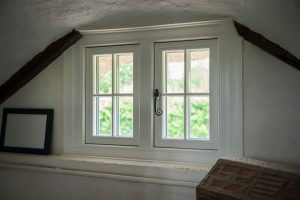
Factors to Consider When Choosing Double Glazing Thickness
When selecting the thickness of double glazing, it’s essential to consider:
- Climate: Homes in colder climates will benefit from thicker glass and wider spacer bars to minimise heat loss.
- Noise Levels: If your property is in a noisy area, opting for thicker panes, such as 6mm or 8mm glass, will provide better sound insulation.
- Building Regulations: Be aware of local building regulations regarding energy efficiency and safety when selecting your windows.
- Cost: While thicker glass and wider spacers can be more expensive, the energy savings and improved comfort they provide make them a worthwhile investment.
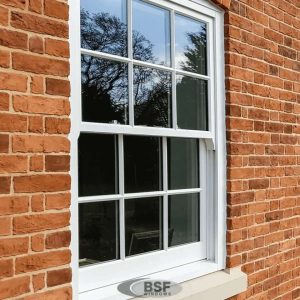
Get Your Double Glazing with BSF Windows
At BSF Windows, we pride ourselves on offering high-quality, energy-efficient double glazing solutions tailored to your home. Whether you’re upgrading for improved energy efficiency, better soundproofing, or a fresh new look, our expert team is here to guide you every step of the way.
Browse our range of windows or request a free, no-obligation quote today. You can also visit our showroom to see how we can help you transform your home with stunning double glazing options.
By understanding the different thicknesses of double glazing and how they impact performance, you can make an informed decision that benefits your home both now and in the future. Let BSF Windows help you find the perfect solution for your property.

